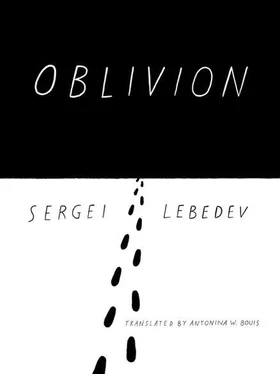The steam engine gave rise to a time whose aesthetics looked to industrial labor for inspiration, a time of the triumph of mechanics; mechanics gave poets metaphors, it was entrusted with the setup of human life, and they tried to take humans apart and put them back together in a new way, to create a homunculus of steel and aluminum with a motor for a heart. The steam engine became a marvelous symbol, the triumph of creative power—but now, as I sensed in my dream, time itself feared it, the way the ancient gods feared the hundred-armed giants they created.
In its furnace, the unbelieving martyrs of the revolution burned as if in a fiery oven, the steam engine brought the body of the leader assigned to be immortal to the capital, and the steam engine itself became one of the minor gods of the new pantheistic religion. Now at the station the arrival of the train spread a sense of dread: the steam engine seemed to have its own understanding of where to go and whom to take, and the trip turned into anxious anticipation—you can never tell at what moment you are traveling at the will of another, elevated above everything else.
The train stopped at the platform and people came out of the cars. The glass dome of the station, the iron beams, all the rivets were covered in the cold sweat of hoar frost on the foggy morning that settled on the smoke particles. Something stuck in the works of the station clock; the minute hand froze, trembling, and the face resembled the round window of baggage scales.
At the very end of the platform, near the steam engine, a few men in uniform appeared; the color and style were not important: amid the overcoats, sheepskin jackets, raincoats, and quilted jackets the essential detail was the uniform itself, identical, anonymous, and severe. It was an image—the image of power, universal, like the law of gravity, so all-encompassing that it has no recognizable features.
The proximity of the steam engine and uniformed soldiers was not accidental: its red star made the stars on the cockades of their caps all the more visible. When they appeared, blocking the exit from the platform, the people who came off the train already belonged to the kind of crowd that appears briefly when a large number of people forced to spend a long time together start to move. This vaguely friendly crowd where the weak attraction of accidental acquaintance was still maintained, moved in a businesslike and almost joyous fashion—the long anticipation was over—and simultaneously each person was separate from his fellow travelers, walking in his own rhythm, and the farther from the wagon, the less this community of people could be called a crowd, for each person was individualized, walking his own road for which the train station was only the starting point, and the law determining the behavior of a crowd did not govern him.
But as soon as the soldiers appeared, the people coming out of the train first slowed down imperceptibly, then each person turned, stumbled, lost his rhythm in order to hide from the soldiers behind the person walking in front. It looked as if a number of targets set at various distances had sidled along in order to hide behind one another. A person walked, hidden behind another’s back, and did not see that behind him someone was walking in his footsteps, and behind him, another, and behind him, yet another … The raucous, cheerful crowd that had filled the platform suddenly squeezed itself into many uneven chains, as if after a chemical reaction that made human atoms combine into extended weaving molecules.
I waited to sense the fear of all those people—it should have erupted, transforming the station air, which had been turned into a trap. However, instead of a sharp eruption I sensed a sedative; there was fear, but it was usual, ordinary, only slightly elevated; there was no tension, it was as if people were rejecting themselves, bidding themselves farewell—and carried themselves to the exit like a pile of folded clothing in an army steam bath, or a prison.
Even though people hid, there was no more intelligence behind it than in the movements of a worm chopped in half by a shovel. Real fear comes in expectation of direct loss of life—here the separation seemed to have taken place much earlier than when the people came out on the platform or even got into the train; it happened almost at birth. Their lives had been taken away from them and returned in the form of a peacoat from naval supply, for temporary use; now, on the platform, their lives were being demanded back—perhaps unexpectedly but with every right to do so.
A separate corner was created next to the soldiers: huddled together were the ones pulled out of the crowd; by its density, the group made an island in the relatively uncongested human sea, but there was no impression of an island at all; you immediately registered one peculiarity—it was as if these people were not there, and only later did you understand why.
Everyone else—many hundreds of people—avoided looking at the prisoners; the prisoners did not look out beyond the limits of their circle, and so the group completely fell out of the entire field of vision.
I tried to hold my gaze and keep it from veering off—but like a compass needle following a magnet, it chased the directing vectors. To break out of the current of gazes that carried me to the exit, past the prisoners, I gazed through the station windows at the freight lines, and there I saw a steam engine that was the twin of the first engine, to which heated freight cars with barred windows were being coupled. At that moment I remembered—remembered in the local “induced” memory of the dream—that I had lived through this already the last time I had this dream, and I swore to watch the freight tracks, the areas of the dream that remained outside my view—swore because this second steam engine, this second train, was intended for the prisoners on the platform.
They began bringing people into the freight cars and I realized that the ones who’d been arrested at the station were taken in order to fill the spots of people who hadn’t been arrested in the city. With the view beyond the borders of the station dome I saw the reason for this anxiety which had seized me when I first spotted the steam engine. The prison train was already in place when the train approached the station, the track curved, and for a period the passengers could see the freight cars from the windows; two different times, present and future, passed very close, like oncoming ships, but the present did not, could not, recognize the future, and the future seemed indifferent to the present. For the passengers, the freight cars were the last meaningless shots in a film of their journey, and if you were to ask any of them a few days later what they had seen when the train was pulling into the station, at best they would recall that there was another train nearby, but nothing more definite than that.
But this particular, this meaningless detail—a prison train on the side tracks, a row of gray-green freight cars—became like cancer cells for those who were arrested, multiplying, devouring the healthy flesh of the universe, growing, blocking out the narrowing horizon, and turning into a single rusted jaw of the freight car.
Along the same tracks that had brought them there, the prisoners would be taken back in the direction from which they had come. But although each of them had arrived as someone with a name, who could say I am so-and-so traveling from here-to-there, now they would become no one, they would not even know where they were being taken.
I saw people moving from the clear bright station, whose dome of glass cells formed a network of coordinates on the platform, drawn with precision, as if in a math workbook, by the sun that had suddenly started to shine above the city’s morning fog, moving into the shadow of other buildings on the freight tracks, for the shadow of the twilight of the night still held sway, detained by the light frost.
Читать дальше












